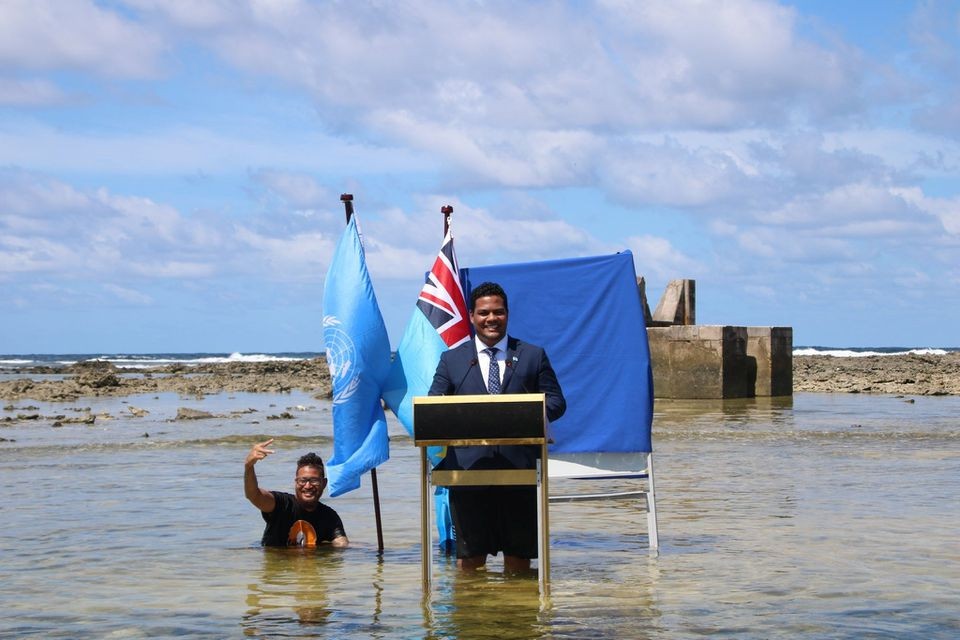It was in a suit and tie, facing the microphones and standing on a small platform in the middle of water that Simon Kofu, Tuvalu's Foreign Minister, delivered a speech to COP26. Representing 8 islands and 12,000 people from the Tuvalu archipelago in Polynesia, the message could not have been more effective. "We are sinking, but so are other people". With water up to his knees, he wanted to demonstrate that in a short time there will be many places that can disappear, because they are submerged. "May global carbon neutrality be ensured by the middle of the century, may 1.5 degrees remain within reach, may urgent and necessary climate finance be mobilized to deal with the losses and damages".
Over 120 political leaders and thousands of experts, activists and public decision-makers went to Scotland for COP26. The 2021 United Nations Climate Change Conference was held for the 26th time in Glasgow and lasted 12 days.
In the final text and after two intense weeks of work, the need for a global reduction of carbon dioxide emissions by 45% by 2030 and the goal of zero net carbon emissions by 2050 was established. Countries are required to present, as early as next year, new commitments to reduce greenhouse gases. Despite intentions to phase out the use of coal and subsidies to fossil fuels, both China and India have sidestepped the argument, accepting to accelerate the "reduction" of these highly polluting sources of energy, but not their extinction. Yet, this was considered a major advance in global environmental measures.
Following some exchange of views on what should be the content of this month's newsletter, the team agreed that the best way to symbolize COP26 would be to continue it, through groups or people directly or indirectly linked to the community of the Lisbon Academic Medical Centre (CAML).
With a special focus on Environmental Health and the effects it has on populations, we listened to two different protagonists of the faculty. Professor and Director of the University Clinic for Infectious Diseases, Emília Valadas, with whom we spoke about the impact of flu in pandemic times, and Osvaldo Santos, a researcher at the Institute of Environmental Health (ISAMB) of the Faculty of Medicine, in order to understand why he claims that “Environmental Health still needs a better definition”. We revisited Liliane Morais’ Ph.D. thesis, which was part of the 1st edition of the ISAMB Ph.D. and addresses the impact of heat waves on mortality in populations.
We went up to the campus Hospital's Infectiology Unit and talked with its Director Álvaro Ayres Pereira and recalled when he announced in the Faculty's Aula Magna that a pandemic was coming. We overcame barriers and got to know what the Portuguese are doing across borders, when they go on humanitarian missions, like João Antunes, or as a volunteer, like our year 5 student Mariana Dores.
We maintain the focus on our younger groups and present two projects powered by natural energy, the one of good will, A Different Christmas and Curarte. Here you will find the testimonials of those who bring joy to those who are admitted to Hospital, whether only during Christmas or at other times. Meet Maria Monteiro, José Domingos, Pedro Fava and Francisca Borges.
At the end of another issue we leave some warning signs.
We remind you that concentrations of greenhouse gases reached record levels in 2020, despite the economic slowdown caused by the pandemic. The UN estimates that, at the current rate of emissions, temperature at the end of the century will be higher by 2.7°C, something that takes the world towards a “catastrophic” path. We further note that the fashion industries are responsible for the production of Co2, up to 8% of global emissions. Environmental organizations say that it is the same as saying that this group accounts for 80% of those displaced by environmental disasters. Finally, we point out that if there are metropolises like Paris, Barcelona, Seoul, Medellín and Toronto that have already improved air quality and safety, agricultural production in African countries could drop 80% by 2050.
"May the nations be the good guardians of the Earth", said Simon Kofu in his "water conference".

In fact, may us all know how to be the Earth's guardians. This month we pay our deep tribute to it and to those who care for it and its people.
Thanks!
Joana Sousa
Editorial Team
news@medicina.ulisboa.pt

